- Home
- Clive Barker
Sacrament
Sacrament Read online
This is a work of fiction. Names, characters, places and incidents either are the products of the author’s imagination or are used fictitiously. Any resemblance to actual events, locales, organizations, or persons, living or dead, is entirely coincidental and beyond the intent of either the author or the publisher.
SACRAMENT. Copyright © 1996 by Clive Barker.All rights reserved under International and Pan-American Copyright Conventions. By payment of the required fees, you have been granted the non-exclusive, non-transferable right to access and read the text of this e-book on-screen. No part of this text may be reproduced, transmitted, down-loaded, decompiled, reverse engineered, or stored in or introduced into any information storage and retrieval system, in any form or by any means, whether electronic or mechanical, now known or hereinafter invented, without the express written permission of PerfectBound™.
PerfectBound™ and the PerfectBound™ logo are trademarks of HarperCollins Publishers, Inc.
Adobe Acrobat E-Book Reader edition v 1. ____ 2001 ISBN
006-009177-0
Print edition first published in 1996 by HarperCollins Publishers, Inc.
10 9 8 7 6 5 4 3 2 1
CONTENTS
Epigraph
PART I He Stands Before An Unopened Door
PART II He Dreams He Is Loved
PART III He Is Lost; He Is Found
PART IV He Meets The Stranger In His Skin
PART V He Names The Mystery
PART VI He Enters The House Of The World
About the Author
Credits
About Perfectbound e-Books
Front Cover
For Malcolm
I am a man, and men are animals who tell stories.
This is a gift from God, who spoke our species into being, but left the end of our story untold.
That mystery is troubling to us.
How could it be otherwise?
Without the final part, we think, how are we to make sense of all that went before: which is to say, our lives?
So we make stories of our own,
in fevered and envious imitation of our Maker, hoping that we’ll tell, by chance, what God left untold.
And finishing our tale,
come to understand why we were born.
I
To every hour, its mystery.
At dawn, the riddles of life and light. At noon, the conundrums of solidity. At three, in the hum and heat of the day, a phantom moon, already high. At dusk, memory. And at midnight? Oh, then the enigma of time itself; of a day that will never come again passing into history while we sleep.
It had been Saturday when Will Rabjohns arrived at the weather-bullied wooden shack on the outskirts of Balthazar. Now it was Sunday morning, two-seventeen by the scored face of Will’s watch. He had emptied his brandy flask an hour before, raising it to toast the Borealis, which shimmered and billowed far beyond Hudson Bay, upon the shores of which Balthazar stood.
He had knocked on the door of the shack countless times, calling out for Guthrie to give him just a few minutes of his time. On two or three occasions it seemed the man was going to do so; Will heard him grumbling something incoherent on the other side of the door, and once the handle had been turned. But Guthrie had not appeared.
Will was neither deterred nor particularly surprised. The old man had been universally described as crazy: This by men and women who had chosen as their place of residence one of the bleaker corners of the planet. If anyone knew crazy, Will thought, they did. What besides a certain lunacy inspired people to build a community—even one as small as Balthazar (population: thirty-one)—on a treeless, wind-battered stretch of tidal flats that was buried half the year beneath ice and snow, and was for two of the remaining months besieged by the polar bears who came through the region in late autumn waiting for the bay to freeze? That these people would characterize Guthrie as insane was a testament to how crazy he really was.
But Will knew how to wait. He’d spent much of his professional life waiting, sitting in hides and dugouts and wadis and trees, his cameras loaded, his ears pricked, watching for the object of his pursuit to appear. How many of those animals had been, like Guthrie, crazed and despairing? Most, of course.
Creatures who’d attempted to outrun the creeping tide of humankind, and failed; whose lives and habitats were in extremis. His patience was not always rewarded. Sometimes, having sweat or shivered for hours and days he would have to give up and move on, the species he was seeking, for all its hopelessness, preserving its despair from his lens.
But Guthrie was a human animal. Though he had holed himself up behind his walls of weather-beaten boards, and had made it his business to see his neighbors (if such they could be called, the nearest house was half a mile away) as seldom as possible, he was surely curious about the man on his doorstep, who had been waiting for five hours in the bitter cold. This was Will’s hope, at least; that the longer he could stay awake and upright the likelier it became that the lunatic would surrender to curiosity and open the door.
He glanced at his watch again. It was almost three. Though he had told his assistant, Adrianna, not to stay up for him, he knew her too well to think she would not by now be a little concerned. There were bears out there in the dark: eight hundred, nine hundred pounds some of them, with indiscriminate appetites and unpredictable behavior patterns. In a fortnight, they’d be out on the ice floes hunting seal and whale. But right now they were in scavenging mode, come to befoul themselves in the stinking garbage heaps of Churchill and Balthazar, and—as had occasionally happened—to take a human life. There was every likelihood that they were wandering within sniffing distance of him right now, beyond the throw of Guthrie’s jaundiced porch light, studying Will, perhaps, as he waited on the doorstep. The notion didn’t alarm him. Quite the reverse, in fact.
It faintly excited him that some visitor from the wilderness might at this very moment be assessing his palatability. For most of his adult life he’d made photographs of the untamed world, reporting to the human tribe the tragedies that occurred in contested territories. They were seldom human tragedies. It was the populace of the other world that withered and perished daily.
And as he witnessed the steady erosion of the wilderness, the hunger in him grew to leap the fences and be part of it, before it was gone.
He tugged off one of his furlined gloves and plucked his cigarettes out of his anorak pocket. There was only one left. He put it to his numbed lips and lit up, the emptiness of the pack a greater goad than either the temperature or the bears.
“Hey, Guthrie,” he said, rapping on the blizzard-beaten door, “how about letting me in, huh? I only want a couple of minutes with you. Give me a break.”
He waited, drawing deep on the cigarette and glancing back out into the darkness. There was a group of rocks twenty or thirty yards beyond his Jeep; an ideal place, he knew, for bears to be lurking. Did something move among them? He suspected so.
Canny bastards, he thought. They were biding their time, waiting for him to head back to the vehicle.
“Fuck this!” he growled to himself. He’d waited long enough. He was going to give up on Guthrie, at least for tonight.
He was going to head back to the warmth of the rented house on Balthazar’s Main (and only) Street, brew himself some coffee, cook himself an early breakfast, then catch a few hours’ sleep.
Resisting the temptation to knock on the door one final time, he left the doorstep, digging for the keys as he strode back over the squeaking snow to the Jeep.
At the very back of his mind, he’d wondered if Guthrie was the kind of perverse old bastard who’d wait for his visitor to give up before opening the door. He was. Will had no sooner vacated the comfort of the porch light when he heard the door grinding acro
ss the frosted steps behind him. He slowed his departure but didn’t turn, suspecting that if he did so Guthrie would simply slam the door again. There was a long silence. Time enough for Will to wonder what the bears might be making of this peculiar ritual. Then, in a worn voice, Guthrie said, “I know who you are and I know what you want.”
“Do you?” Will said, chancing a backward glance.
“I don’t let anybody take pictures of me or my place,” Guthrie said, as though there was an unceasing parade of photographers at his door.
Will turned now, slowly. Guthrie was standing back from the step, and the porch light threw very little illumination upon him. All Will could make out was a very tall man silhouetted against the murky interior of the shack. “I don’t blame you,” Will said, “not wanting to be photographed. You’ve got a perfect right your privacy.”
“Well then, what the fuck do you want?”
“Like I said: I just want to talk.”
Guthrie had apparently seen enough of his visitor to satisfy his curiosity, because he now stepped back a pace and started to pull the door closed. Will knew better than to rush the step. He stayed put and played the only card he had. Two names, spoken very softly. “I want to talk about Jacob Steep and Rosa McGee.” The silhouette flinched, and for a moment it seemed certain the man would simply slam the door, and that would be an end to it. But no. Instead, Guthrie stepped back out onto the step.
“Do you know them?” he said.
“I met them once,” Will replied, “a very long time ago. You knew them too, didn’t you?”
“Him, a little. Even that was too much. What’s your name again?”
“Will—William—Rabjohns.”
“Well . . . you’d better come inside, before you freeze your balls off.”
II
Unlike the comfortable, well-appointed houses in the rest of the tiny township, Guthrie’s dwelling was so primitive it barely seemed habitable, given how bitter the winters up here could be.
There was .a vintage electric fire heating its single room (a small sink and stove served as a kitchen, the great outdoors was presumably his bathroom), while the furniture seemed to have been culled from the dump. Its inhabitant was scarcely in better condition. Dressed in several layers of grimy clothes, Guthrie was plainly in need of nourishment and medication. Though Will had heard that he was no more than sixty, he looked a good decade older, his skin red-raw in patches and sallow in others, his hair, what little he had, white where it was cleanest. He smelled of sickness and fish.
“How did you find me?” he asked Will as he closed and triple-bolted the door.
“A woman in Mauritius spoke to me about you.”
“You want something to warm you up a bit?”
“No, I’m fine.”
“What woman’s this?”
“I don’t know if you’ll remember her. Sister Ruth Buchanan?”
“Ruth? Christ. You met Ruth. Well, well. That woman had a mouth on her . . .” He poured a shot of whiskey into a well-beaten enamel mug, and downed it in one. “Nuns talk too much. Ever noticed that?”
“I think that’s why there are vows of silence.” The reply pleased Guthrie. He loosed a short, barking laugh, which he followed with another shot of whiskey. “So what did she say about me?” he asked, peering at the whiskey bottle as if to calculate how much solace it had left to offer.
“Just that you’d talked about extinction. About how you’d seen the last of some animals.”
“I never said anything to her about Rosa and Jacob.”
“No. I just assumed if you’d seen one you might have seen the other.”
“Huh.” Guthrie’s face knitted up as he thought this through. Rather than be seen to be studying him—this was not a man who took kindly to scrutiny—Will crossed to the table to look at the books that were piled upon it. His approach brought a warning growl from under the table. “Shut up, Lucy!” Guthrie snapped. The dog hushed its growl, and came out of hiding to ingratiate herself. She was a sizable mongrel, with strains of German shepherd and Chow in her bloodline, better fed and groomed than her master. She’d brought her bone out with her, and dutifully carried into her master’s feet.
“Are you English?” Guthrie said, still not looking at Will.
“Born in Manchester. But I was brought up in the Yorkshire Dales.”
“England’s always been a little too cozy for me.”
“I wouldn’t call the moors cozy,” Will said. “I mean, it’s not wild like this, but when the mists come down and you’re out on the hills—”
“That’s where you met them then.”
“Yes. That’s where I met them.”
“English bastard,” Guthrie said. Then, finally looking at Will, “Not you. Steep. Chilly, English bastard.” He spoke the three words as if cursing the man, wherever he was. “You know what he called himself?” Will knew. But it would serve him better, he suspected, if he let his host have the moment. “The Killer of Last Things,” Guthrie said. “He was proud of it. I swear. Proud of it.” He emptied the remnants of the whiskey into his mug but didn’t drink. “So you met Ruth in Mauritius, huh? What were you doing there?”
“Taking pictures. There’s a kestrel there looks like it’s going to be extinct some time soon.”
“I’m sure it was grateful for your attention,” Guthrie said dryly. “So what do you want from me? I can’t tell you anything about Steep or McGee. I don’t know anything, and if I ever did I put it out of my head. I’m an old man and I don’t want the pain.” He looked at Will. “How old are you? Forty?”
“Good guess. Forty-one.”
“Married?”
“No.”
“Don’t. It’s a rattrap.”
“It’s not likely, believe me.”
“Are you queer then?” Guthrie said, with a little tilt of his head.
“As it happens, yes.”
“A queer Englishman. Surprise, surprise. No wonder you got on so well with Sister Ruth. She Who Must Not Be Touched. And you came all this way to see me?”
“Yes and no. I’m here to photograph the bears.”
“Of course, the fucking bears.” What little trace of warmth or humor his voice had contained had suddenly vanished. “Most people just go to Churchill, don’t they? Aren’t there tours now, so you can watch them performing?” He shook his head.
“Degrading themselves.”
“They just go where they can find a free meal,” Will said.
Guthrie looked down at the dog, who had not moved from his side since her reprimand. Her bone was still in her mouth.
“That’s what you do, isn’t it?” The dog, happy she was being addressed, whatever the subject, thumped her tail on the bare floor. “Little brown-noser.” Guthrie reached down as if to take the bone. The dog’s ragged black lips curled back in warning.
“She’s too bright to bite me and too stupid not to growl. Give it to me, you mutt.” Guthrie tugged the bone from her jaws. She let him take it. He scratched her behind her ear and tossed the bone back on the floor in front of her. “I expect dogs to be sycophants,” he said, “we made ’em that way. But bears—Jesus, bears shouldn’t be fucking nosing around in our garbage. They should stay out there,” he vaguely waved in the direction of the bay, “where they can be whatever God intended them to be.”
“Is that why you’re here?”
“What, to admire the animal life? Christ no. I’m here because being with people makes me vomit. I don’t like ’em. I never did.”
“Not even Steep?” Will said.
Guthrie shot him a poisonous look. “What in Christ’s name kind of question is that?”
“Just asking.”
“Fucking stupid question,” Guthrie muttered. Then, softening somewhat, he said, “They were something to look at, both of them, and that’s the truth. I mean, Christ, Rosa was beautiful. I only put up with talking to Steep to get to her. But he said once I was too old for her.”
“How old we
re you?” Will asked him, thinking as he did so that Guthrie’s story was changing slightly. He’d claimed to know only Steep, but apparently he’d known them both.
“I was thirty. Way too old for Rosa. She liked ’em real young. And of course she liked Steep. I mean the two of them, they were like husband and wife and brother and sister and fuck knows what else all rolled into one. I didn’t stand a chance with her.” He let the subject trail away, and picked up another. “You want to do some good for these bears?” he said. “Get out there on the dump and poison ’em. Teach ’em not to come back. Maybe it’ll take five seasons, and that’ll be a lot of dead bears, but they’ll get the message sooner or later.” Finally he downed the contents of his glass, and while the liquor still burned his throat said, “I try not to think about them, but I do—” He wasn’t talking about the bears now, Will knew. “I can see both of them, like it was yesterday.” He shook his head. “Both of them so beautiful. So . . . pure.” His lip curled at the word, as though he meant its antithesis. “It must be terrible for them.”
“What must be terrible?”
“Living in this filthy world.” He looked up at Will. “That’s the worst part for me,” he said. “That the older I get, the more I understand ’em.” Were those tears in his eyes, Will wondered, or simply rheum? “And I hate myself for it so fucking much.” He put down his empty glass and with sudden determination announced, “That’s all you’re getting from me.” He crossed to the door and unbolted it. “So you may as well just get the hell out of here.”
“Well, thank you for your time,” Will said, stepping past the old man and into the freezing air.
Guthrie waved the courtesy away. “If you see Sister Ruth again—”
“I won’t,” Will said. “She died last February.”
“What of?”
“Ovarian cancer.”
“Huh. That’s what you get for not using what God gave you,” Guthrie said.
The dog had joined them at the threshold now and was growling loudly. Not at Will this time, but at whatever lay out there in the night. Guthrie didn’t hush her, but stared out at the darkness. “She smells bears. You’d better not hang around.”

 The Great and Secret Show
The Great and Secret Show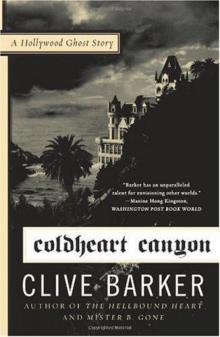 Coldheart Canyon: A Hollywood Ghost Story
Coldheart Canyon: A Hollywood Ghost Story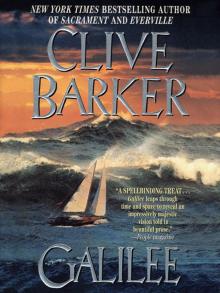 Galilee
Galilee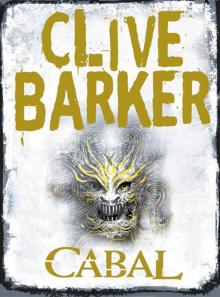 Cabal
Cabal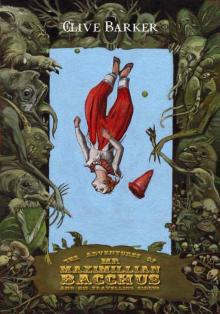 The Adventures of Mr. Maximillian Bacchus and His Travelling Circus
The Adventures of Mr. Maximillian Bacchus and His Travelling Circus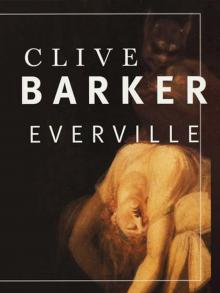 Everville
Everville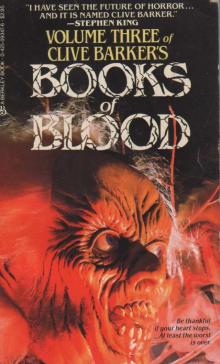 Books of Blood: Volume Three
Books of Blood: Volume Three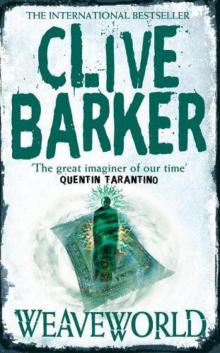 Weaveworld
Weaveworld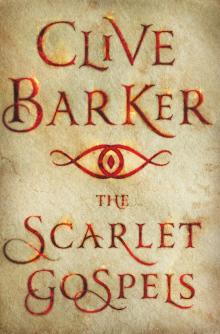 The Scarlet Gospels
The Scarlet Gospels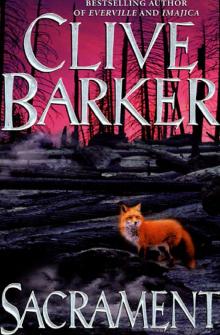 Sacrament
Sacrament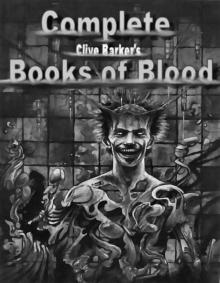 Books of Blood: Volumes 1-6
Books of Blood: Volumes 1-6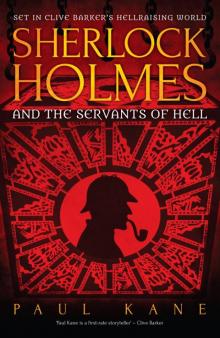 Sherlock Holmes and the Servants of Hell
Sherlock Holmes and the Servants of Hell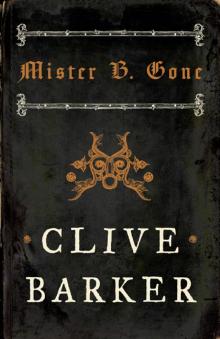 Mister B. Gone
Mister B. Gone Imajica
Imajica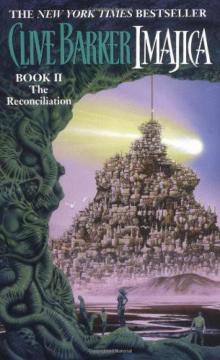 The Reconciliation
The Reconciliation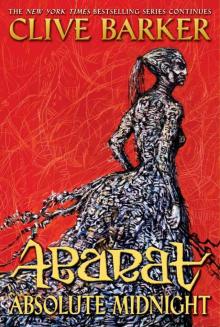 Abarat
Abarat Clive Barker's First Tales
Clive Barker's First Tales The Hellbound Heart
The Hellbound Heart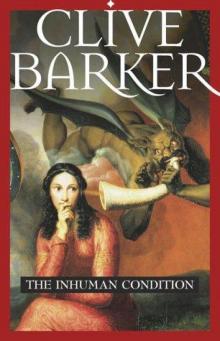 The Inhuman Condition
The Inhuman Condition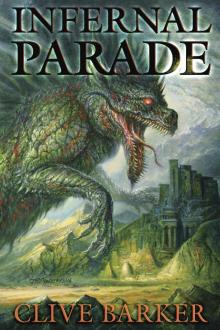 Infernal Parade
Infernal Parade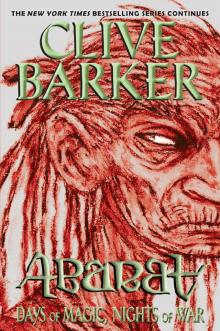 Days of Magic, Nights of War
Days of Magic, Nights of War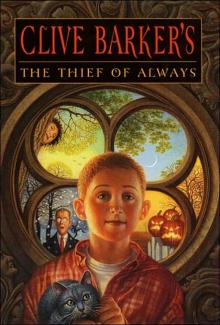 The Thief of Always
The Thief of Always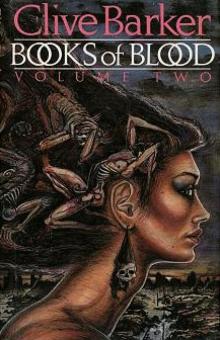 Books of Blood Vol 2
Books of Blood Vol 2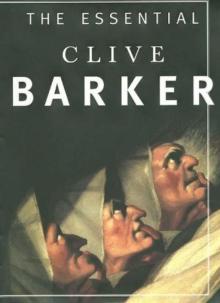 The Essential Clive Barker
The Essential Clive Barker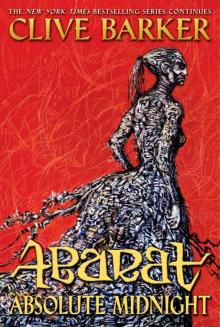 Abarat: Absolute Midnight a-3
Abarat: Absolute Midnight a-3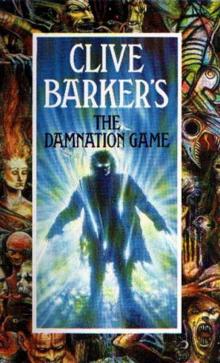 The Damnation Game
The Damnation Game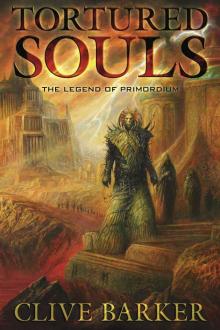 Tortured Souls: The Legend of Primordium
Tortured Souls: The Legend of Primordium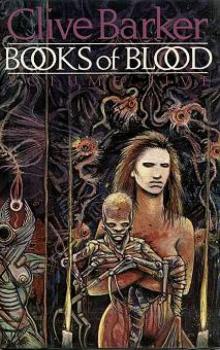 Books of Blood Vol 5
Books of Blood Vol 5 Imajica 02 - The Reconciliator
Imajica 02 - The Reconciliator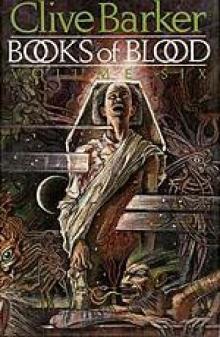 Books Of Blood Vol 6
Books Of Blood Vol 6 Imajica 01 - The Fifth Dominion
Imajica 01 - The Fifth Dominion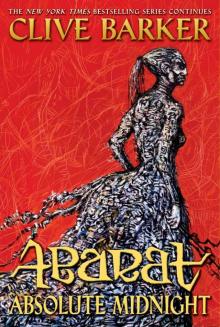 Abarat: Absolute Midnight
Abarat: Absolute Midnight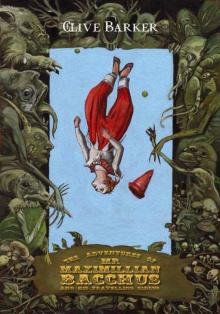 The Adventures of Mr. Maximillian Bacchus & His Traveling Circus
The Adventures of Mr. Maximillian Bacchus & His Traveling Circus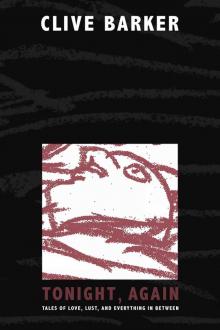 Tonight, Again
Tonight, Again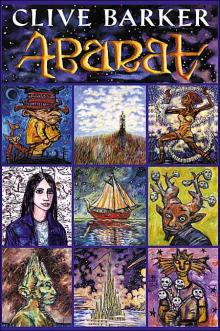 Abarat: The First Book of Hours a-1
Abarat: The First Book of Hours a-1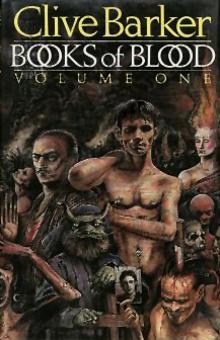 Books Of Blood Vol 1
Books Of Blood Vol 1 Age of Desire
Age of Desire Imajica: Annotated Edition
Imajica: Annotated Edition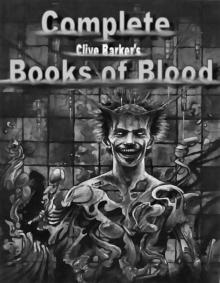 Complete Books of Blood
Complete Books of Blood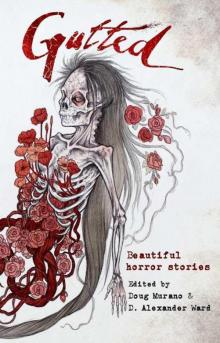 Gutted: Beautiful Horror Stories
Gutted: Beautiful Horror Stories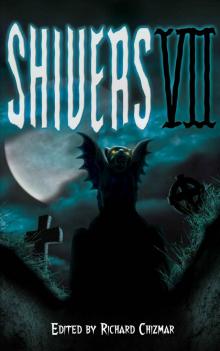 Shivers 7
Shivers 7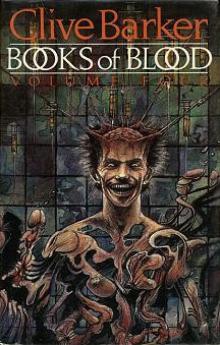 Books Of Blood Vol 4
Books Of Blood Vol 4